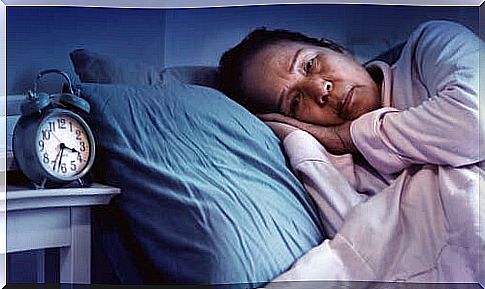Alzheimer’s Disease And Changes In Sleep Rhythm

Alzheimer’s disease is the most common dementia-causing disease in the world, and one of its many symptoms is changes in sleep rhythm and sleep quality.
In this article, we’ll tell you about the most common sleep-related changes that people with Alzheimer’s can experience.
What is Alzheimer’s disease?
Alzheimer’s disease is the most common dementia disease among the world’s population. About 48 million people around the world suffer from it. Due to the increase in life expectancy, it is estimated that the number of cases will increase much in the coming years.
It causes cognitive impairment that affects a person’s normal life in both personal, social, and professional settings. In this disease, protein stores are formed around and inside nerve cells, and cell death and cell failure occur when nerve cells interact.
The disease causes clinical memory loss. It is the main symptom of the disease, but it can also manifest itself in many other ways. Some of the symptoms associated with memory loss include changes in language and behavior. This can also affect lack of sleep.

Sleep disorders associated with Alzheimer’s disease
Usually, sleep disorders develop in the context of the disease. However, the type of changes and the effect on the patient depend on the person and the stage of the disease.
The changes in sleep caused by Alzheimer’s disease can be divided into different types:
- Changes in sleep structure. This is related to the stages of sleep. In people with Alzheimer’s, the stages of deep sleep are reduced. There are more micro-awakenings and awakenings in general. The amount of REM sleep also decreases.
- Changes in respiration. This may include snoring, hypopnea, and obstructive sleep apnea (OSAHS). It has been found that people with this disease have a much higher number of such sleep-related problems than healthy patients. Researchers have also studied these sleep disorders individually, as the treatments are precise and similar to the disease.
- Restless Legs Syndrome. A person has a need to move their legs constantly or occasionally by going to bed. The syndrome can also be associated with nightmares.
Alzheimer’s disease and changes in sleep rhythm
Alzheimer’s disease causes changes in biological rhythm. This develops along with the disease, making it more noticeable as the disease progresses.
A change in biological rhythm causes drowsiness during the day. The patient may fall asleep in the middle of the day and need a nap. This can also lead to an increase in social problems as it becomes more difficult to maintain conversations and interact with people in a normal way.
Such drowsiness and sleeping during the day can also make a person sleep less at night. It makes the patient wake up more often during the night as well as be restless and walk around the house.

Sundowning phenomenon in Alzheimer’s disease
One of the specific changes in the biological rhythm is the sundowning phenomenon. In it , patients with dementia begin to experience worse symptoms towards the end of the day, especially in terms of behavior. Patients may experience increased restlessness and irritation.
In addition to restlessness and nervousness, patients may suffer from hallucinations, delusions, unexplained fears, or even seizures. As many as 20% of patients with dementia experience the symptoms caused by this phenomenon.
What to do about sleep?
Although dementia is the best known symptom of Alzheimer’s disease, the disease does not manifest itself merely as memory loss. The disease can be associated with many symptoms and they manifest differently in different patients. It is always extremely important that every person gets the right diagnosis, goes for an examination and tells the doctor about the symptoms they are experiencing.
The doctor should decide in each case what is the best treatment. Your doctor may need to apply treatment for such a disease several times to get the best possible effect.









